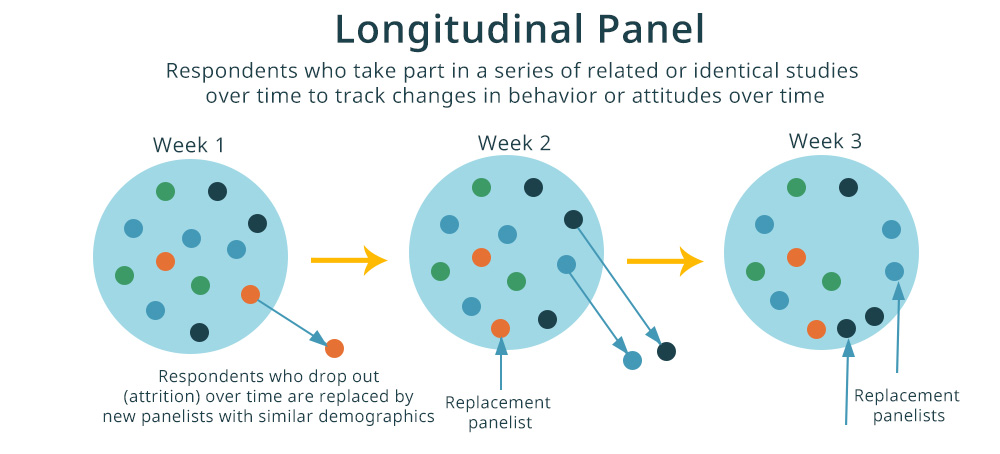As with any form of research, there are considerations to be aware of when deciding upon the methodology best fit for accomplishing research goals. Research panels can be a powerful tool when used for the right reasons, but the same can be said for other sampling methods such as Random Digit Dialing. In this post, we will share key information about what a research panel is, how panels are used best, and what should be considered when using a research panel for a project.
Research Panel vs. Sample
The terms “research panel” and “sample” may seem like they are used interchangeably, but, in fact, the two are different in both what they are and how they are used.
Market Research Panels
In the most general sense, panels refer to groups of pre-recruited respondents that have consented to taking surveys; however, the word “panel” can refer to both large, general market research panels recruited by a research company to take any study, and more specific panels who take studies on a specific topic or even the same study over time. For example, a research organization may have a panel based on a specific location or interest—like a USA panel or a panel of farmers. Each panelist on this type of panel consents to be contacted by the research organization if they are selected to participate in a future research project and typically provides the organization with their demographic information. Researchers then select respondents to participate in research projects as they arise based on the demographic needs of each particular project. This type of panel keeps recruitment costs and turnaround time low for individual projects. Market research firms typically have access to these panels, and they are often used by organizations who do not have access to their own respondents to take research studies.

The other use of the word panel refers to strategically selected groups of people who have agreed to participate in a series of surveys that occur at regular intervals over a given period of time. This type of panel is often used for gathering longitudinal data on a particular topic that all participants have some sort of connection to. Sometimes, questionnaires are even identical for each survey in the series that a research panel participates in, which allows for insights to be drawn based on changes in responses to the same questions, by the same respondents, over the course of the survey series.
As an example of this type of panel, an organization focused on providing aid to people living without adequate access to food may create a research panel with the goal of tracking their organization’s success at getting food into the mouths of low-income earners in Darfur. The respondents on the panel would be recruited based on the qualifications of: income below a pre-determined threshold and must live in Darfur. Researchers typically take this one step further when creating a research panel by ensuring that the panel has representation per the demographic distribution of the population in the area—in order to have the panel be representative of the population being studied. Depending on the panel setup and size, each survey may be distributed to the entire panel, or may be distributed to a random selection of respondents in the larger panel. Once there have been two or more surveys distributed in the series, the organization can begin to compare and contrast the resulting data and draw insights on how their food security projects are performing, which is why utilizing a research panel methodology is desirable.
Research Sample
The word sample refers to the specific group who responded to a study. Every single research project has a sample, whether the sample was sourced from a larger panel, or the sample was recruited specifically for the project at hand. Even studies that are conducted over time with the same set of respondents have a sample. The word sample simply refers to the people who participated in a single study, so in survey series’ each individual survey’s participants would be called the sample—even if the samples are the same for each survey in the series.
Pros and Cons of Research Panels
A research panel methodology provides more benefits than just tracking changes over time. For example, research panels often result in high response rates and cheaper recruitment costs overall due to the fact that the respondents opt-in to participate in surveys before beginning the survey series. These benefits, however, come with some risk. Depending on the length and/or complexity of the questionnaire, as well as how frequently the respondents are expected to participate, respondents may become fatigued with the work involved in participation in the long-term. Panels often need to be refreshed so that new respondents are brought in to replace those who no longer wish to participate.
To maintain strong panel retention and high response rates, it is best to weigh the opinions of research experts on how to best balance questionnaire length, frequency of survey participation, and incentives provided to respondents based on the mode of research. Researchers that conduct panel surveys often have learned through years of trial and error how to best engage various populations, which can ensure a project makes the most of the allotted budget.
GeoPoll’s Panels and Capabilities
GeoPoll is a research company focused on utilizing mobile telecommunications technology to reach people in areas of sub-Saharan Africa, Asia, and Latin America. Our expertise in rural and remote areas of the world lend tremendous resources to humanitarian aid organizations and expanding corporate enterprises alike. We use several sampling methodologies, and can create new panels for ongoing research or recruit respondents for one-time studies from our own database of respondents who are pre-stratified by demographics. To learn more about how GeoPoll can help your team accomplish research goals, contact us today.

